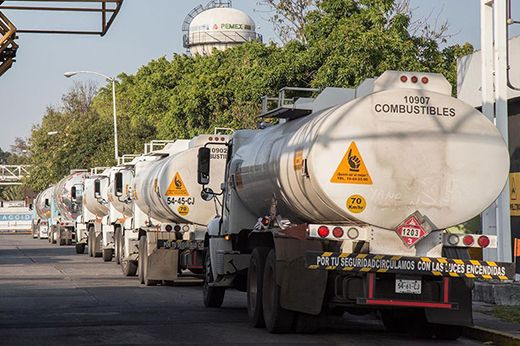Pemex: more transportation by pipelines, less land and with tanker trucks

Pemex transported more petroleum products by pipelines and less by land and tanker trucks in 2020 compared to 2019.
This company is the largest in Mexico, and its subsidiaries include the eleventh largest crude oil producer in the world and the twentieth largest oil and gas company in the world according to 2019 data.
In 2020, Pemex transported a total of 1 million 804,300 barrels per day of petroleum products: 1 million 278,700 barrels per day (70.9%) were injected through pipelines, 361,400 barrels per day (20.0%) were transported by land transportation and the remaining 164,200 barrels per day (9.1%) were transported by tanker trucks.
For comparative purposes, in 2019, Pemex’s transportation by pipelines comprised 69.4%; by land transportation, 20.9%, and by tanker trucks, 9.7 percent.
The company‘s logistics segment operates through the state subsidiary Pemex Logistics and provides transportation, storage and distribution services by land, sea and by pipelines to some of Pemex’s subsidiaries and other companies, including Tesoro México Supply & Marketing, S. de RL de C.V. (a subsidiary of Marathon Petroleum Corporation), local gas stations and distributors.
Pemex
During 2020, the company injected 1 million 140,600 barrels per day of crude oil and petroleum products into its pipelines, representing a decrease of 12.2% compared to 2019 when it injected approximately 1 million 299,400 barrels per day, mainly due to controlled operations. aimed at reducing fuel theft in its pipeline transportation systems in line with its strategy to combat fuel theft and declining sales as a result of the Covid-19 pandemic.
At the same time, during 2020, the company injected 134,200 barrels of LPG per day, representing an increase of 1.1% compared to the 132,700 barrels of LPG per day injected in 2019, due to an increase in the transportation of liquefied gas through pipelines.
In addition, it injected 3,800 barrels per day of petrochemicals in 2020, a decrease of 11.6% compared to the 4,300 barrels per day it injected in 2019.
More than anything, this decrease was due to lower isobutane requirements at the Minatitlán and Salina Cruz refineries.
![]()

